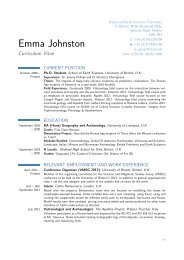What is Scientific Progress?
What is Scientific Progress?
What is Scientific Progress?
You also want an ePaper? Increase the reach of your titles
YUMPU automatically turns print PDFs into web optimized ePapers that Google loves.
progress<br />
In the h<strong>is</strong>tory of science there are, for good reasons, no ep<strong>is</strong>odes that illustrate prec<strong>is</strong>ely such a<br />
divergence between truth and rationality. Most scient<strong>is</strong>ts have been pretty rational and science as a<br />
whole <strong>is</strong> moderately if imperfectly rational. There are some exceptions to the latter. As <strong>is</strong> well<br />
known Réné Blondlot believed in the ex<strong>is</strong>tence of what he called N-rays for what it <strong>is</strong> clear were<br />
entirely spurious and irrational reasons. Imagine for sake of argument that we were to d<strong>is</strong>cover that<br />
there are in fact hitherto unobserved entities answering to Blondlot’s description of N-rays. So<br />
Blondlot’s belief in N-rays would have been true but unjustified and not knowledge. The semantic<br />
approach would have to regard Blondlot’s belief (which was widely shared in France) as<br />
constituting progress. That <strong>is</strong> clearly wrong.<br />
t<br />
fig 2.1 (c)<br />
Cases such as Blondlot’s are atypical. There are actual (rather than imaginary) cases of true<br />
scientific beliefs that were not knowledge. But because of the general rationality of science, there<br />
beliefs will typically have had at least some confirmation. Hence we are entitled to show some<br />
admiration for scient<strong>is</strong>ts who got it right but lacked the evidence to prove their hypotheses.<br />
Ar<strong>is</strong>tarchus of Samos proposed a heliocentric system 2,000 years before Copernicus, with the<br />
geocentric views of Ar<strong>is</strong>totle and Ptolemy filling the intervening gap. Alfred Wegener famously<br />
proposed the theory of continental drift over half a century before it became accepted. We might be<br />
tempted to think that science m<strong>is</strong>sed a trick or two here. Would it not have been more progressive to<br />
5






